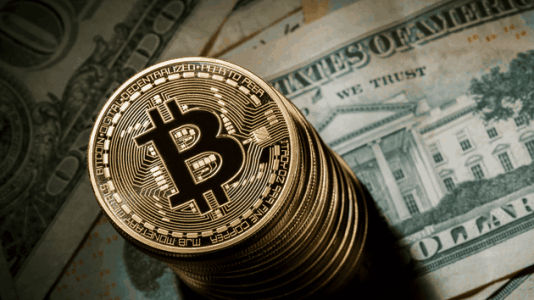During this period of time, the attitudes of many domestic regulatory authorities including the central bank to the virtual currency and blockchain have become more clear.
For example, Zhou Xiaochuan, the newly resigned central bank governor, made clear at the press conference of the two conferences that Bitcoin could not be used as a retail payment tool and did not like such speculative products. However, for the blockchain, the support from the state is not small, and even Xiongan has already cooperated with Ant Financial to launch the application of the blockchain.

Coupled with the ban on ICO and the healthy development of the blockchain industry, the distinct bipolar attitude seems to have determined the future fate of the currency circle and chain, at least for the domestic.
Of course, as the decisive existence of the virtual currency that can stand up in the country and continue to expand, the exchange has long been smelling the policy, and the currency has become the first exchange to go to the sea, and the exchange that has not gone to sea has begun to be 2017. The heat of the outbreak turned into a collective ban in early 2018.
A public relations officer who once had an exchange said to the author: "Now due to the policy environment, I have decided not to speak in the country for the time being."
Therefore, when we see some exchanges encounter negative, the vocal channel is not a so-called "official statement", but a personal WeChat circle of friends from the company's top leader.
When the policy-driven blockchain market moved from chaos to clarity, exchanges that did not follow the footsteps of the currency began to prepare themselves for the road through the sea.
Today, OKCoin announced that it will start operations in South Korea and has also received investment from the NHN Group of Korea. At present, China, Japan and South Korea should be the three largest markets for virtual currency. China does not have to say that 75% of the calculation power is enough to explain any problem, and South Korea has rumored that the government will ban the speculation after 200,000 people can petition. It is seen that the Korean market should not be inferior to the domestic market, while Japan contributed a half-flow (45.5%) to Ripple.com.
It seems that OKCoin has also found a relatively good overseas shelter. Prior to this, Xu Mingxing also stated immediately after Zhou Xiaochuan's speech that he was "ready to hand over to the country at any time", and his words revealed a strong desire for survival.
In addition, exchanges such as the fire currency are similar to the currency security. They have already set up their own branches in Singapore, Hong Kong, South Korea and other countries and regions. However, it is different from the foreign currency users. Still "hold" the domestic market, however, since the Spring Festival this year, the fire currency has opened the daily 404 mode, so that some retail investors will be exclaimed "fire coins to finish."

When the exchange came out, the policy was a big incentive. After all, the ICO was banned. The air currency, fake projects, and fraudulent investment also made the retail investors feel chilly. The government’s rectification of the financial environment has always been rapid and decisive, just like the original P2P. Bare.
The countries selected by the exchange are generally also welcome to the virtual currency, such as Singapore. As early as last year, it was reported that the central bank has begun experimenting with the national digital currency established in Ethereum. Even if it is regulated, it will stay. In the "consideration" phase.
The possibility of a big change in attitude is Japan. When the ICO was banned in China, Japan’s policy on ICO was still relatively loose, so it attracted Coin’s headquarters to move its headquarters to the country.
However, as ICO began to be cautiously treated by Asian countries, Japan’s attitude has also begun to change. From the previous reminder to relying on legislation to regulate exchanges, especially the NEM of the $530 million worth of Japan’s largest exchange, Coincheck, was stolen. Let the voice of regulating virtual currency in Japan become higher and higher.
As a result, the currency that went to sea early will also experience the policy pressures experienced by those exchanges still in the country.
Last week, the money security that had just recovered from the hacked accident received a warning letter from the Japan Financial Services Agency. The Japanese side warned the currency security based on domestic laws and claimed that criminal charges would not be ruled out. Today, the top officials of the Japan Financial Services Agency have also said that the above warning is a serious warning. If the currency continues to provide services to Japanese users, it will use Interpol to pursue its responsibility.
For this matter, the only thing that Qian’an has done is to communicate, hope that users will not be overly nervous, and ... move the headquarters to Malta.
Malta has always been friendly to digital currency, and has also established the Digital Innovation Bureau. The blockchain legal consulting firm of the E&S Group, which is located in the country, has also received support from the authorities. All in all, this is another paradise for digital currency after Japan, and it is also the ideal place for the virtual currency exchange.
Policy risks remain. At the recent meeting of G20 finance ministers and central bank governors, finance ministers and central bank governors agreed that cryptocurrency is an asset rather than a currency, recognizing its advantages in improving financial efficiency and inclusiveness, but also Concerned about tax evasion, money laundering, terrorist financing and other issues. Among the G20 member countries is the European Union, and Malta is one of the EU member states.

Of course, the final G20 communiqué did not indicate that the virtual currency should be supervised, but only said that it would be closely monitored, which reserved a window for adjustment and transformation of the global virtual currency exchange.
As one of the EU member states, Malta has always been open to the virtual currency. However, if the G20 decides to supervise the virtual currency, the currency in Malta may still be unable to escape the fate of Japan.
Blockchains and virtual coins have been blindfolded for less than a year. Both big and retail investors have realized that exchanges are a special presence on the blockchain. The value of regionally-contained tokens is needed. Through this highly central platform to reflect (on the currency), even during this period there are some gray transactions (paying in the currency) that are not visible to outsiders.
Of course, no exchange will recognize the payment of the currency, just as no shared bicycle company admitted to the misappropriation of the deposit, but when the crash, the deposit is always missing.
At present, countries do not have a clear policy on virtual currency. Even if countries such as Japan can cite some legal provisions and the US SEC large-scale review blockchain project is not enough to show their final attitude, countries are slowly waiting to see. Forward.
For the fast-growing exchanges, this kind of environment is the most terrible. No one knows whether the next step is heaven or hell. Even the currency is swayed by countries and drives away between countries. Other platforms How can it be spared?
Although there are many questions from the outside world, it does not mean that only the disappearing blockchain industry will be greeted by the exchanges. The exchange is the medium for the project parties to reach users, and the role of financing and project transparency is still relatively good. Big, but there are very few good projects and few good exchanges.
In order to survive in this "sinister" environment, the necessary transformations are still done, the necessary information is disclosed, the blockchain technology is used to track and trace the project, and the consensus platform is used to establish trading platforms, project parties, and retail investors. The relationship of trust.
As for the policy, as long as the majority of the people support it, the regulatory agencies will not generalize. With a casual operation of paying for the currency, trading back, and so on, how can the majority of retail investors trust, let alone the supervisory department that kills the power. Â
Suizhou simi intelligent technology development co., LTD , https://www.msmvape.com